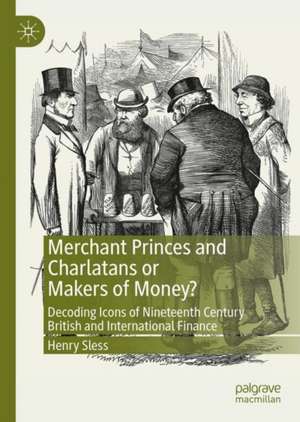Merchant Princes and Charlatans or Makers of Money?: Decoding Icons of Nineteenth Century British and International Finance
Autor Henry Slessen Limba Engleză Hardback – 19 dec 2021
Throughout the book a PEARL methodology has been used to critique the images reflecting the impact of any Publisher’s political bias, the Editorial and Artistic techniques used to convey the messages in the images, and the Legal context (especially a concern in countries such as France and Germany where censorship was strict).
The book concludes that white-collar criminals were invariably secretly admired in Britain, and rarely severely satirised. Similarly, Merchant Princes were depicted favourably in Britain as members of the ruling elite during the latter half of the century. This is contrasted with the more extreme anti-monopolistic images in the US and the extreme anti-Semitic treatment of Jewish financiers in France and Germany.
| Toate formatele și edițiile | Preț | Express |
|---|---|---|
| Paperback (1) | 697.82 lei 6-8 săpt. | |
| Springer International Publishing – 20 dec 2022 | 697.82 lei 6-8 săpt. | |
| Hardback (1) | 703.20 lei 6-8 săpt. | |
| Springer International Publishing – 19 dec 2021 | 703.20 lei 6-8 săpt. |
Preț: 703.20 lei
Preț vechi: 827.28 lei
-15% Nou
Puncte Express: 1055
Preț estimativ în valută:
134.57€ • 140.32$ • 111.84£
134.57€ • 140.32$ • 111.84£
Carte tipărită la comandă
Livrare economică 21 martie-04 aprilie
Preluare comenzi: 021 569.72.76
Specificații
ISBN-13: 9783030866037
ISBN-10: 3030866033
Pagini: 402
Ilustrații: XXXIII, 338 p. 165 illus., 98 illus. in color.
Dimensiuni: 148 x 210 mm
Greutate: 0.59 kg
Ediția:1st ed. 2022
Editura: Springer International Publishing
Colecția Palgrave Macmillan
Locul publicării:Cham, Switzerland
ISBN-10: 3030866033
Pagini: 402
Ilustrații: XXXIII, 338 p. 165 illus., 98 illus. in color.
Dimensiuni: 148 x 210 mm
Greutate: 0.59 kg
Ediția:1st ed. 2022
Editura: Springer International Publishing
Colecția Palgrave Macmillan
Locul publicării:Cham, Switzerland
Cuprins
Introduction.- Financial context.- Visual context.- The merchant princes.- The charlatans.- Financial iconography.- Gender.- The other.- The law.- Dreams and the unconscious.- Conclusion.
Notă biografică
Henry Sless is currently a Research Associate at Henley Business School at the University of Reading, UK. He received a Master’s in historical cartoons from the University of Kent, UK, and a doctorate in visual images of finance in the Victorian era from the University of Reading. For further details of his areas of interest, please see his site: www.figuringfinance.com
Textul de pe ultima copertă
This book provides a critical analysis of visual images of British and international finance during the nineteenth century. Its focus is on the financiers themselves, contrasting the depiction of the respectable Merchant Princes with the less than perfect charlatans (white-collar criminals) who defrauded investors of millions. The breakdown of trust between financiers and investors that evolved during this period is represented visually in depictions of the emotional response of investors to the uncertain financial climate.
Throughout the book a PEARL methodology has been used to critique the images reflecting the impact of any Publisher’s political bias, the Editorial and Artistic techniques used to convey the messages in the images, and the Legal context (especially a concern in countries such as France and Germany where censorship was strict). The book concludes that white-collar criminals were invariably secretly admired in Britain, and rarely severely satirised. Similarly, Merchant Princes were depicted favourably in Britain as members of the ruling elite during the latter half of the century. This is contrasted with the more extreme anti-monopolistic images in the US and the extreme anti-Semitic treatment of Jewish financiers in France and Germany.
Henry Sless is currently a Research Associate at Henley Business School at the University of Reading, UK. He received a Master’s in historical cartoons from the University of Kent, UK, and a doctorate in visual images of finance in the Victorian era from the University of Reading.
Throughout the book a PEARL methodology has been used to critique the images reflecting the impact of any Publisher’s political bias, the Editorial and Artistic techniques used to convey the messages in the images, and the Legal context (especially a concern in countries such as France and Germany where censorship was strict). The book concludes that white-collar criminals were invariably secretly admired in Britain, and rarely severely satirised. Similarly, Merchant Princes were depicted favourably in Britain as members of the ruling elite during the latter half of the century. This is contrasted with the more extreme anti-monopolistic images in the US and the extreme anti-Semitic treatment of Jewish financiers in France and Germany.
Henry Sless is currently a Research Associate at Henley Business School at the University of Reading, UK. He received a Master’s in historical cartoons from the University of Kent, UK, and a doctorate in visual images of finance in the Victorian era from the University of Reading.
Caracteristici
The only book to specifically analyse visual images of finance in Britain during the nineteenth century Represents a unique multi-disciplinary approach to the study of financial history Depicts the financiers, Merchant Princes, and Charlatans, and the financial events through which they lived
